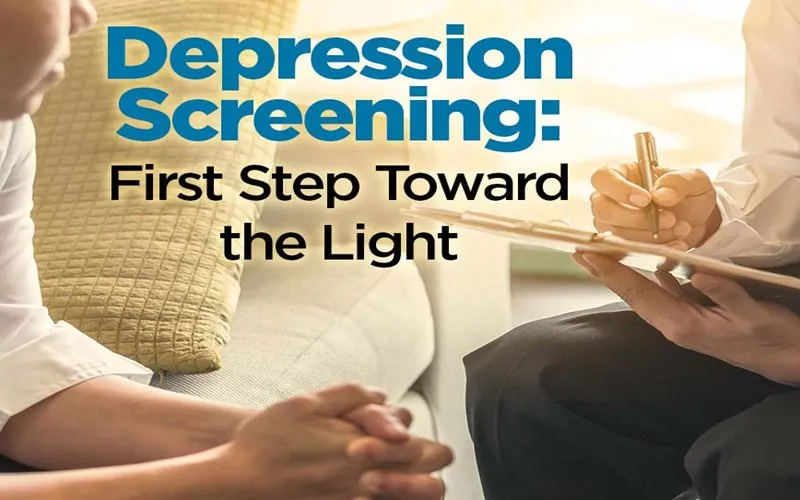Feeling down or depressed? This little test will help you see yourself clearly in an instant
It is common to feel down, but if this feeling lingers and even interferes with your life, it may not just be a "bad mood". In the United States, more than 17 million adults suffer from depression each year (data from the National Institute of Mental Health), but many people are unaware of it. With this short and scientific self-test, you can quickly distinguish your emotional state. The following content is rigorous and practical, helping you to understand the truth in a few minutes.

Test instructions
Time frame: Review your feelings over the past two weeks. Depression symptoms must persist to be meaningful.
Real answers: Only by being honest with yourself can the results be reliable.
Follow-up advice: This is not a professional diagnosis. If the results show a tendency towards depression, please contact a professional.
Test steps: 10 key questions
The following questions refer to the depression criteria of the Diagnostic and Statistical Manual of Mental Disorders (DSM-5). Answer "yes" (1 point) or "no" (0 points) and record the total score.
Persistent sadness
Do you feel sad, empty, or desperate almost every day, and you don't know why?
Example: You feel down even when the weather is nice.
Loss of interest
Have you lost interest or pleasure in activities you once enjoyed (e.g., movies, sports)?
Example: When a friend invites you to a party, you just want to stay home.
Sleep disturbances
Do you have insomnia (not being able to sleep) or hypersomnia (sleeping too much) most nights?
Example: Waking up in the early morning and unable to fall back asleep.
Changes in appetite or weight
Have you experienced a significant increase or decrease in your appetite, resulting in a weight change of more than 5% in two weeks (unintentional)?
Example: Losing 5 pounds without intending to.
Extreme fatigue
Do you feel unusually tired every day, making even simple tasks (e.g., getting dressed) difficult?
Example: Waking up and still feeling weak.
Self-denial
Do you often feel worthless or blame yourself excessively for small things?
Example: Feeling bad about yourself for not replying to a message.
Distractions
Do you have trouble concentrating, such as getting distracted while reading or making mistakes?
Example: Reading a page of a book several times.
Slowed reaction
Do you feel that your body or mind is slowing down, and even others can notice it?
Example: Your reaction is obviously slow when you speak.
Irritability
Are you more anxious or angry than usual, even for trivial things?
Example: Getting angry because of traffic jams.
Negative thoughts
Do you think about death repeatedly, or feel that "life is meaningless" (not necessarily suicide)?
Example: Often think "life is so tiring".
Scoring and interpretation
0-3 points: Mild depression, which may be stress or fatigue. Rest and adjust.
4-6 points: Moderate risk, may have mild depression. Observe for a week, if there is no improvement, seek help.
7-10 points: High risk, consistent with the characteristics of depression. Contact a professional for evaluation as soon as possible.
Result analysis and action suggestions
If it is depression
Practice: Take a 20-minute walk every day, chat with friends, and ensure 7-9 hours of sleep.
Goal: Rejuvenate through small changes.
If it might be depression
Practice: Record changes in symptoms; call the SAMHSA hotline (1-800-662-4357, 24/7 toll-free); schedule an appointment with a psychologist through Psychology Today.
Goal: Intervene early to prevent worsening.
Data support
The National Alliance on Mental Illness states that 60% of people with depression are not diagnosed at the beginning. Early identification can increase the success rate of treatment to 80% (American Psychological Association). This test is consistent with clinical standards and has reliable reference value.
Next steps
Whatever the result, focusing on the heart is the key. If the score makes you uneasy, don't bear it alone - text "HELLO" to Crisis Text Line (741741, free support) or find a local doctor. Low mood may dissipate, but depression needs help. You are not alone.
Featured Articles
 Spotting the Warning Signs: Key Indicators of Depression to Look Out ForRecognizing early warning signs of depression is vital for promoting mental health awareness and timely intervention. Common indicators include prolonged sadness, feelings of hopelessness, and a lack of interest in activities that once brought joy. Other symptoms can range from physical fatigue and appetite changes to sleep disturbances and feelings of worthlessness. Drastic mood shifts, social withdrawal, and unexplained physical pain may also point to depression.
Spotting the Warning Signs: Key Indicators of Depression to Look Out ForRecognizing early warning signs of depression is vital for promoting mental health awareness and timely intervention. Common indicators include prolonged sadness, feelings of hopelessness, and a lack of interest in activities that once brought joy. Other symptoms can range from physical fatigue and appetite changes to sleep disturbances and feelings of worthlessness. Drastic mood shifts, social withdrawal, and unexplained physical pain may also point to depression. Recognizing Depression in Seniors: 10 Key Signs RevealedDepression is often misunderstood, particularly when it comes to seniors. Many older adults face various life challenges, including health issues, loss of loved ones, and isolation, which can lead to feelings of sadness or hopelessness. However, distinguishing between normal aging and clinical depression can be challenging for caregivers and family members. Recognizing the signs of depression in seniors is crucial for their well-being and quality of life. In this article, we will explore the ten key signs of depression in seniors, empowering you to take action for yourself or a loved one. Keep reading to uncover these vital insights.
Recognizing Depression in Seniors: 10 Key Signs RevealedDepression is often misunderstood, particularly when it comes to seniors. Many older adults face various life challenges, including health issues, loss of loved ones, and isolation, which can lead to feelings of sadness or hopelessness. However, distinguishing between normal aging and clinical depression can be challenging for caregivers and family members. Recognizing the signs of depression in seniors is crucial for their well-being and quality of life. In this article, we will explore the ten key signs of depression in seniors, empowering you to take action for yourself or a loved one. Keep reading to uncover these vital insights. Harmony of the Mind- Nurturing Mental Health in a Symphony of CareIn the grand symphony of healthcare, mental health emerges as a poignant movement, weaving through the complex fabric of human experiences. To understand the dynamics, let's delve into the delicate chords of mental health services, exploring the triggers of psychological challenges and charting a pa
Harmony of the Mind- Nurturing Mental Health in a Symphony of CareIn the grand symphony of healthcare, mental health emerges as a poignant movement, weaving through the complex fabric of human experiences. To understand the dynamics, let's delve into the delicate chords of mental health services, exploring the triggers of psychological challenges and charting a pa